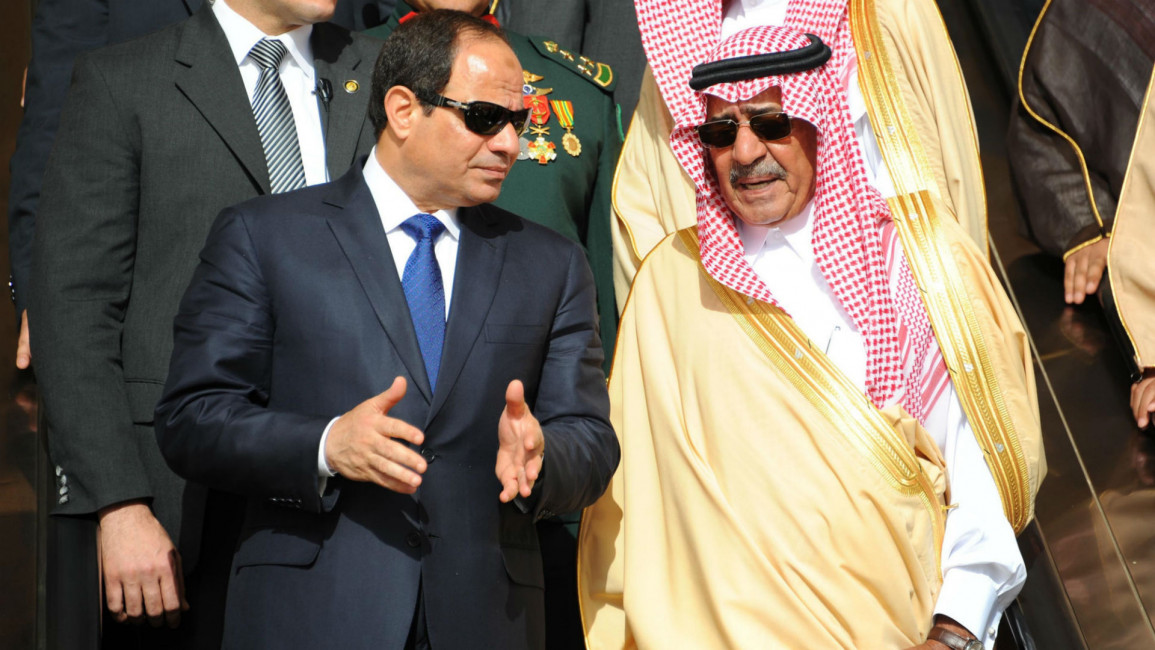
Beneath the populist facade, Egypt's Sisi is a neolilberal
President Abdel Fatah al-Sisi's much-awaited economic conference in Sharm al-Sheikh is being celebrated in the Egyptian media as a great achievement in and of itself.
The praises are being sung as if the conference itself already means that the corporations, institutions and states represented will immediately start pouring investment into the crisis-ridden Egyptian economy.
Already forgotten is the fact that the conference was originally suggested by the late King Abdullah of Saudi Arabia as an emergency aid conference for donors rather than the investment fair it is currently being presented as.
A born-again neoliberal
| The conference was originally an emergency aid conference for donors rather than the investment fair. |
International financial institutions, headed by the International Monetary Fund, have been praising Sisi's economic policies over the past weeks.
This comes as no surprise. The General has slashed fuel subsidies, increasing the price of lighting and heating homes by between 40 and 80 percent - substantially raising the cost of living for the poor, particularly for the nearly 50 percent of the population living on less than two dollars a day.
He has promised to gradually remove all subsidies. And most recently, Sisi reduced the corporate income tax ceiling from 25 percent to 22.5 percent - with an extra five percent reduction in sales taxes on tools and equipment.
Sisi is turning out to be more a neoliberal disciple of Gamal Mubarak rather than a populist disciple of Gamal Abdel Nasser, as some of his supporters and media campaigners try to portray him.
Any comparison between Sisi's speech and performance in Davos earlier this year and those of the younger Mubarak at the same venue would find it difficult to discover any real policy differences. In fact, if anything, the General is proving to be as ruthless in his implementation of neoliberal policy as he is in his repression of political opposition.
The fact that the army is a major partner in all the large economic projects on offer is again nothing new and does not represent any kind of return of "the state" as a major player in the economy.
Neoliberalism in Egypt and elsewhere has always involved a corrupt partnership between the state and big business.
The renowned Marxist geographer David Harvey described the neoliberal project as a process of "accumulation by dispossession". The corporations and the rich accumulate more and more wealth as the poor not only get poorer, but loose the few rights and benefits they had gained in previous eras.
In the case of Egypt, most of these rights were eroded during the Mubarak era. Privatisation, the removal of subsidies, scrapping of laws protecting tenants on agricultural land, reduction of public spending on education, health, transportation and other basic services, had all led to an unprecedented increase in poverty and suffering for the majority of Egyptians.
On the other hand, the same policies, oiled by a corrupt state, led to the emergence of a group of billionaires, who monopolised most sections of the Egyptian economy, in partnership with both the country's generals and the oil rich Gulf states.
A revolution against social injustice
| Dictatorship and neoliberalism are old friends. |
The Egyptian revolution of 2011 was not only a political revolution against dictatorship and police brutality, but also a social revolution against decades of neoliberal dispossession by the generals, the rich oligarchs and their Gulf partners, under the careful supervision of the International Monetary Fund, the World Bank and successive US administrations.
Unfortunately, the short-lived presidency of Mohamed Morsi and the Muslim Brotherhood had no intention of challenging the position and policies of the rich and powerful.
Instead, they meekly and naively asked for a small share of the cake - negotiating with the same institutions, implementing the same neoliberal policies, begging money from the same Gulf states and making concession after concession to the generals and the billionaires.
Yet Egypt's old ruling elite and its partners had and still have no intentions of sharing any of its wealth and power, not with the Muslim Brotherhood and certainly not with the Egyptian people.
Today, that elite is gathering again in Mubarak's favourite spot, Sharm al-Sheikh, with his generals, business partners and Gulf and Western backers, to implement and finance the exact economic policies that helped fuel the 2011 revolution in the first place.
Dictatorship and neoliberalism are old friends. In fact, the first major neoliberal experiment took place in Chile more than 40 years ago after a similarly bloody coup by a similarly sunglassed ruthless general.
But times have changed, and Egypt is simmering with anger - even after the brutal repression of the past 18 months, investment will not pour in, at least not in the quantities and at the rate the General dreams of.
And no investment fair in sunny Sharm al-Sheikh will change that.


![Minnesota Tim Walz is working to court Muslim voters. [Getty]](/sites/default/files/styles/image_684x385/public/2169747529.jpeg?h=a5f2f23a&itok=b63Wif2V)




